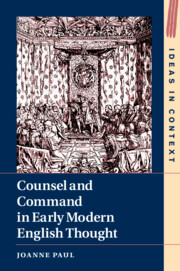Book contents
- Counsel and Command in Early Modern English Thought
- Ideas in Context
- Counsel and Command in Early Modern English Thought
- Copyright page
- Contents
- Acknowledgements
- Introduction
- Part I
- Chapter 1 The Humanist Counsellor
- Chapter 2 The Right-Timing of Counsel
- Part II
- Part III
- Bibliography
- Index
- Ideas in Context
Chapter 2 - The Right-Timing of Counsel
from Part I
Published online by Cambridge University Press: 18 February 2020
- Counsel and Command in Early Modern English Thought
- Ideas in Context
- Counsel and Command in Early Modern English Thought
- Copyright page
- Contents
- Acknowledgements
- Introduction
- Part I
- Chapter 1 The Humanist Counsellor
- Chapter 2 The Right-Timing of Counsel
- Part II
- Part III
- Bibliography
- Index
- Ideas in Context
Summary
The events of the Henrician Reformation served to put pressure on the problem of counsel and especially on its proposed timely solution. A second generation of English humanists took on this question, thinking more deeply about what the opportune moment was and how it related to the question of frank counsel. Thomas Starkey makes this issue central to his Dialogue Between Pole and Lupset, criticizing More’s approach, though he never resolves the problem fully. It is Thomas Elyot, in his works published in 1531 and 1533, who writes at length on the issue of right-timing and counsel, like Starkey coming to a critique of the ‘silence until kairos’ strategy espoused by Erasmus and More. These writers are also directly concerned with the relationship between counsel and command. In the context of the late 1520s and 1530s, theirs is a concern that counsel does not have enough authority over command, and that it will need to be supported or bolstered in some fashion to have its proper influence.
- Type
- Chapter
- Information
- Counsel and Command in Early Modern English Thought , pp. 41 - 68Publisher: Cambridge University PressPrint publication year: 2020

